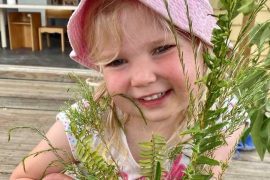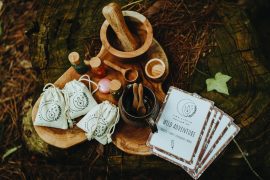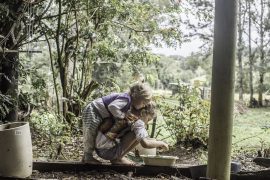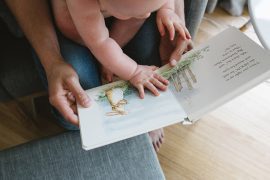NQS: QA1: Educational Program and Practice
Standard 1.1 – The educational program enhances each child’s learning and development.
- – Approved learning framework
- – Program learning opportunities
Standard 1.2 – Educators facilitate and extend each child’s learning and development.
1.2.1 – Intentional teaching
Core focus: To teach Charlie phonological awareness and phonics through a play-based approach. This will help Charlie develop early language and literacy skills which will help build his future skills for reading spelling and writing.
What I loved about this activity as an educator and a mumma was that:
- It was FUN.
- Incorporating syllables learning into sensory play meant there was lots of repetition (great for moving knowledge learnt from working memory to long-term memory).
- The sensory play is also assisting Charlie in reducing his sensory overload/overstimulation making him more relaxed and present in the moment – which means he enjoys it more AND it increases his learning.
- Sensory play is Charlie’s jam – so this activity provides the comfort of what he know and loves, mixed with the little challenge of adding something new to extend his interest. (doesn’t have to be sensory play, use whatever your child enjoys!).
- As a mumma, knowing they are being exposed to phonological awareness through phonics within their play lessens that overwhelming anxiety I first mentioned.
- It helps children learn about the world around them.
- Teaches new ways of communication.
- Great for building the foundation for language and literacy skills (watch it begin to blossom from here!).
Areas of Development this activity supported:
- Language and literacy skills
- Memory skills
- Problem solving
- Communication skills
- Increase in vocabulary
- Rhyme detection
- Initial phoneme identification and alliteration
- Cognitive development skills
- Fine motor skills
- Hand-eye coordination
- Patience and understanding
- Creating a bond with a parent / carer
- Making learning fun
Extension Activities: Use daily routines and tasks to practice syllable counting such as packing up – ask the children to clap out or verbalise the sounds of the objects they are collecting as they put them away.
Sound tables: if you are focusing on a number of syllables in a word, put a collection of objects together with that amount of syllables for children to explore.
Use mirrors in your play so the children can see themselves sounding out the words – both with their mouths and by clapping. This is a great opportunity for them to develop their listening skills as well by encouraging focus onto the patterns of the sounds.
Use mirrors in your play so the children can see themselves sounding out the words – both with their mouths and by clapping.
Loose parts play: use natural loose parts such as sticks and stones so children can use them to count out syllables and break them down.
Dramatic play: shopping for syllables. Get the children to gather items such as play food and separate them into baskets allocated to the syllable number (1,2,3,4 syllables).
This article was written by Early Childhood Educator, Angie of www.instagram.com/popandpudplay in collaboration with Busy Books Australia,










